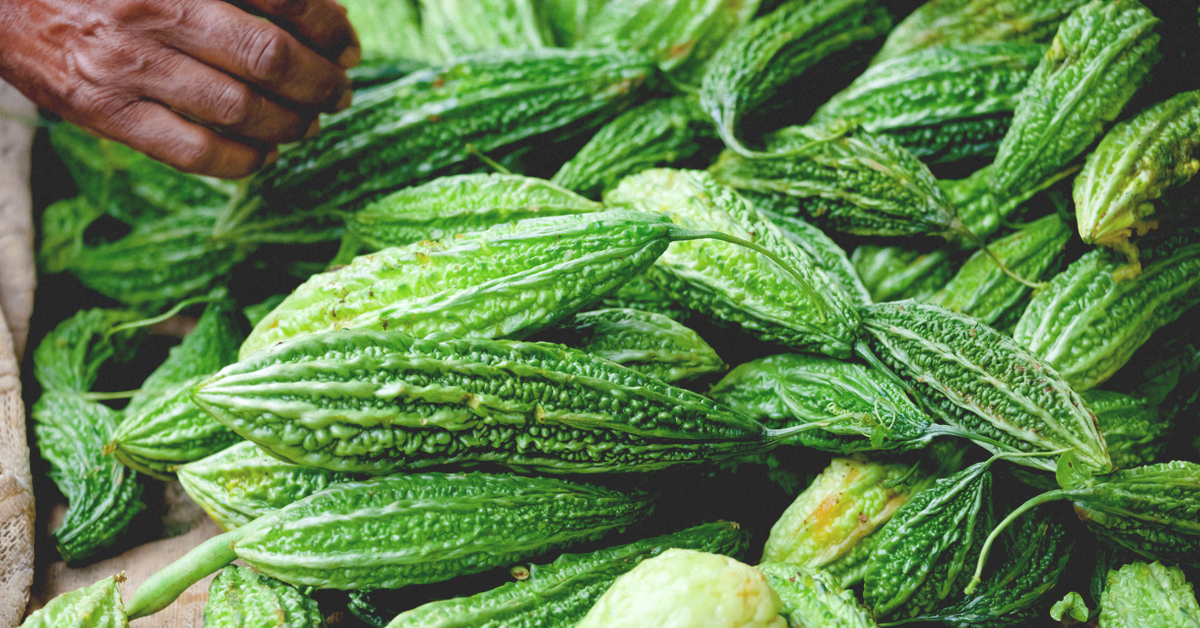7 Benefits of Bitter Melon for Diabetes, Cancer and More!
Bitter melon is known as a type of nutritious and medicinal fruit that is native to the continents of Asia, Africa and much of the Caribbean. It has a long history of use in China, Ayurvedic medicine – a traditional healing system that has been practiced in India for more than 3,000 years – and also in some of the healthiest places in the world, such as Okinawa, Japan (one of the “blue zones” of the world). In the next post we will take a closer look at the benefits of bitter melon.
Much of the history makes it clear that the culinary uses of both bitter melon and its benefits originated in India, and then entered into the practice of Traditional Chinese Medicine in the mid-fourteenth century.
“Knowing that bitter foods tend to be cleansers for the body and capable of increasing liver health, the Chinese were attracted to the extremely bitter taste of bitter melon”.
Although researchers say more studies are required to recommend its use for certain conditions, according to a review, the findings show that bitter melon has some of the following benefits:
- Control blood sugar levels and diabetes
- Reduce respiratory infections such as pneumonia
- Decrease inflammation and increase immunity
- Treatment of abdominal pain, peptic ulcers, constipation, cramps and fluid retention
- Increasing protection against cancer
- Reduce fevers and cough
- Reduce menstrual irregularity
- Treatment of skin conditions that include eczema, scabies and psoriasis
- Antiviral, antibacterial and anthelmintic properties (including those that can be used to prevent or treat parasites, HIV / AIDS, malaria and even leprosy)
- Treatment of gout, jaundice and kidney stones
- Control the symptoms of autoimmune disorders, including rheumatoid arthritis
Bitter Melon Benefits:
1. Help to Normalize Blood Sugar Levels:
The findings of studies in humans and animals have demonstrated a hypoglycemic effect of the concentrated extract of bitter melon, which means that it helps reduce blood glucose (sugar) levels and regulates the use of insulin by the body. In many ways, bitter melon extract acts like the insulin that the body produces naturally. It is believed that there are more than 100 studies that use modern techniques have authenticated its use in diabetes and its complications ». Diabetic symptoms and complications that bitter melon extract can help control include:
- Insulin resistance and high blood sugar levels

- Nephropathy (kidney damage)
- Eye disorders such as cataracts or glaucoma
- Hormonal irregularities and menstrual changes in women
- Complications of the heart and damage to blood vessels
While multiple studies have found that Momordica charantia may be beneficial to normalize the sugar in the blood and control diabetes, its effects seem to depend on how it is consumed. One study showed that bitter melon consumed raw or in juice helps reduce blood glucose levels in healthy and diabetic animals, although other studies have found that the responsiveness varies by individual. This study analyzed the hypoglycemic effects of bitter gourd extract and seeds in mice with normal or elevated blood sugar levels. The data showed that bitter gourd extract (1 g / kg) significantly reduced the blood glucose level of normal and diabetic mice. He did so primarily by regulating the insulin signaling pathways in the muscles and fat cells (adipose tissues), which helps the cells to take more glucose from the blood, as needed. Bitter gourd was shown to target insulin receptor sites and stimulate downstream pathways, leading researchers to conclude that it can serve as a beneficial “glucose metabolism regulator.”
Other research has identified a mixture of active components within bitter melon that are responsible for their antidiabetic abilities. These include: steroidal saponins (known as charantines), insulin-like peptides and alkaloids, which are mainly concentrated in the fruit of the Momordica charantia plant.
2. Combat Infections and Bacterial Viruses:
Research has shown that the benefits of bitter gourd contain various forms of antibacterial and antiviral agents. These agents are able to decrease the susceptibility to infections such as Helicobacter pylori (a very common bacterium linked to the formation of stomach ulcers when someone’s immune function is low), along with viruses, including HIV. A report states that bitter melon powder has been used in Ayurveda for centuries “to remove dust from leprous and other intractable ulcers in wound healing, especially when mixed with cinnamon, pepper, rice and chaulmugra oil. «In recent years, bitter gourd extract has been used successfully against pylorus ligation, aspirin and stress-induced ulcers in rats, which show significant reductions in ulcer symptoms. In addition, studies have identified anthelmintic agents within bitter gourd, a group of antiparasitic compounds that help expel parasitic worms and other internal parasites from the body. Anthemintics work by killing parasites internally, without causing significant damage to the host (the person or animal that carries the parasite).
3. Improves Digestive and Liver Health:
There is evidence that bitter melon extract can help reduce stomach and intestinal disorders, decrease kidney stones, help prevent liver disease and improve liver function, help treat parasitic worms that enter the gastrointestinal tract, reduce disease symptoms inflammatory bowel (including colitis) and improve digestive health. Research showed that bitter gourd extract increased levels of glutathione peroxidase (GPx), superoxide dismutase (SOD) and catalase, which helps improve detoxification and prevent liver damage. Bitter melon also has natural laxative effects and, therefore, helps relieve constipation. A traditional use of bitter melon was to reduce stomach aches and ulcers. Recently, it has even been discovered that it can help act against the Helicobacter pylori bacteria that contributes to the formation of ulcers.
4. It can Help Increase Protection Against Cancer:
Although the results of the studies have been inconsistent, several studies have demonstrated the efficacy of bitter gourd to prevent or treat various types of cancer: lymphoid leukemia, lymphoma, choriocarcinoma, melanoma, breast cancer, skin tumor, prostate cancer, carcinoma of the tongue and larynx, bladder cancer and Hodgkin’s disease.
How does bitter melon act as a food that fights cancer?
The Department of Biophysics, Molecular Biology and Bioinformatics of the University of Calcutta states that Momordica charantia has “anti-cancer, antimutagenic and antitussive” properties. Although more research is still needed, to date a small group of studies have found that cancer patients who use bitter melon in addition to other treatments have shown promising results. Bitter melon extracts have been shown to increase metal chelation, promote detoxification, prevent lipid peroxidation and inhibit free radical damage, contributing to cell mutations and tumor growth. The Faculty of Biomedical Sciences of the University of Hong Kong has identified more than 20 active components within the bitter gourd that have antitumor properties. Upon concluding their research on bitter gourd as an “antidiabetic, anti-HIV and anti-tumor compound,” they declared that bitter melon is “a health cornucopia and deserves in-depth research for its future clinical application.”
5. Reduce Respiratory Disorders and Symptoms:
Through increased detoxification, improved blood flow, reduced inflammation and decreased free radical damage, bitter melon is able to prevent common diseases such as coughs, colds or the flu. A strong immune system and a well-functioning digestive system are essential to avoid possible infections and diseases, as well as to reduce seasonal allergies and asthma. In traditional Chinese medicine, bitter melon fruit juice has been used to treat dry cough, bronchitis and sore throat for hundreds of years. Today’s studies show that bitter melon juice, fruit and seeds can be beneficial in preventing respiratory diseases, coughs, mucus and food allergies.
6. Helps Treat Inflammation and Skin Wounds:
Several studies have identified anti-inflammatory compounds within the benefits of bitter melon that help treat skin diseases such as eczema and psoriasis. Due to its antibacterial properties, traditionally (and sometimes until today) bitter melon has also been used topically on the skin to treat deep skin infections (abscesses) and wounds without the use of antibiotics.
7. It can Help Prevent Obesity and Heart Disease:
Bitter melon fruit extract has demonstrated a strong antioxidant activity in human and animal studies. In addition to balancing the hormones related to diabetes, there is a possibility that bitter melon acts as a therapeutic agent to prevent obesity and other symptoms related to metabolic syndrome and cardiovascular diseases (such as high cholesterol and high blood pressure). Although more research is still needed, experimental studies in animals and clinicians show that bitter melon is beneficial to prevent weight gain through the mediation and induction of fat and lipid metabolism processes, gene expressions that control appetite and body weight and reduce inflammation.
How to Use the Benefits of Bitter Melon?
 Bitter melon fruit can be eaten alone, cooked or consumed as an extract / tablet.
Bitter melon fruit can be eaten alone, cooked or consumed as an extract / tablet.
- Look for fruits of immature bitter melon that are green, firm and free of bruises or cracks. Store it at cool temperatures, ideally in the refrigerator, for 1 to 2 weeks or until its green color begins to seep.
- If you can find all the fruit, you can try cooking it in a traditional way in Asia: sauté it with potatoes, garlic, chili and onion until its strong smell is reduced.
- You can take up to 100 milliliters of fresh bitter melon juice once a day. If you want to reduce the bitterness of fresh fruit or fresh fruit juice, use a small amount diluted with fresh fruit or vegetable juice or add a small amount of raw honey.
- The dose of bitter melon extract depends on the condition being treated. Most research shows that taking about 1000-2000 milligrams daily has the strongest effects. Many brands recommend dividing doses into 2-3 portions and taking capsules after meals to help with absorption.
- Bitter melon is usually taken in doses of 1-2 capsules, three times a day after meals, for up to 3 months. This amount has been shown to help improve blood sugar administration / diabetic conditions, but not enough is known about its effects when used for more than 3 months in a row.
- Look for pure bitter melon extract in the form of a tablet or capsule that is ideally certified as organic, without project verification without GMO, gluten-free, magnesium stearate-free and does not contain synthetic additives.
Possible Side Effects of Bitter Melon:
Based on the research available at this time, bitter melon is intended to be used in conjunction with other preventive measures (such as eating a healthy diet and exercising to control inflammation), along with conventional treatments when necessary. Here are some possible side effects and precautions to consider before using bitter melon products:
- While bitter melon has proven hypoglycemic effects, the available scientific data is not sufficient to recommend its use to treat diabetes without careful supervision and monitoring. Bitter melon “cannot be recommended as an insulin or hypoglycemic replacement therapy” at this time, so if you are diabetic or prediabetic, it is better to talk with your doctor about the use of bitter melon. Extract in addition to your current treatment plan. Because bitter gourd reduces blood sugar, it can interact with diabetes medications. If you take diabetes medications, keep in mind that they may reduce your blood sugar level too much and therefore it is recommended that you control them.
- Pregnant women, those who are trying to get pregnant and women who are breastfeeding should not consume bitter gourd, since research shows that it has some abortive properties (those that can cause spontaneous abortions), can cause menstrual bleeding and has some antifertility capacities.
- If you have recently had surgery, have been fasting or have lost substantial blood for some other reason, bitter gourd should be avoided, as it can interfere with blood sugar control and cause side effects such as dizziness or fainting.


